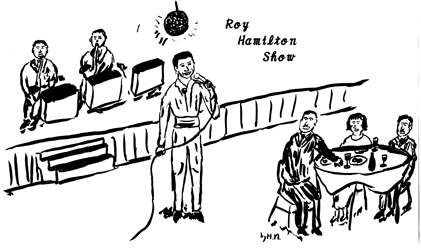

While black rhythm & blues of independent labels brought rock'n'roll for whites in 1950s, there had already been a way of completing cross-over for blacks : they were sold as standard pop singers by corporated labels like Capitol or Columbia. Nat King Cole, who had once played jazz as a pianist and leader, made his success by singing pops since late '40s, and Johnny Mathis had hit albums containing standard ballads since late '50s. Casting a side glance at independent labels' rock'n'roll hits, these huge companies would often have black singers sing standard pops until Beatles appeared in mid-and-late '60s. It was true that such labels made records in their own peculiar style including Mahalia Jackson's gospel or Harry Belafonte's calypso. But 'The Queen of Soul' Aretha Franklin, who was nurtured by gospel, had little known what to do with her voice among the arrangements of gorgeous strings or jazz treatments, and Sam Cooke released RCA albums containing many sweet pop readings. Roy Hamilton made records from Columbia subsidary Epic since mid '50s, many of which were standard pops. Despite it, he had some rock'n'rollin' sides and pop sides which did not end in old-fashioned ones, and they were aired on black radio stations.
"The Golden Age of American Rock'n'Roll vol.4" and "vol.10", compilations of various hits from mid '50s to early '60s, contain Roy Hamilton's Don't Let Go and You Can Have Her. As I had known Isaac Hayes' discofied Don't Let Go, it was a pretty surprise to me. The former was written by Jesse Stone who made Joe Turner's Shake, Rattle and Roll, one of the first rock'n'roll hits. Roy's delivery is smooth and easy, so it can be said as black rockabilly. The latter is backed by deluxe strings and chorus but it is rock'n'rollin'. Roy's gospel-tinged rendition and deep shouting are all good. They have coolness different from independents' sometimes unrefined and sometimes shrewd treatments, and then I felt like getting his compilation best.
I got his best "Anthology" in my hands, however, it contains only a few of his rock'n'rollin'tunes and most of his tunes are renditions of musical songs and pops. Roy Hamilton, who used to sing gospel in the church, had a rich baritone voice with good vibrato like Billy Eckstine, and it was certain that he could sing standard pops well like his predecessors. Among many sweet ballads there are tunes you cannot miss. You'll Never Walk Alone is from the musical "Carousel", and Roy Hamilton gives it dramatic reading as if he were on the stage of the opera house. Since its lyrics lead to gospel for the salvation of soul, it is one of favorites with blacks and it is sung by some R&B or soul singers. Unchained Melody was for a B-movie and it is almost the Roy Hamilton's original. I can imagine a scene of his soaring appearance in a musical accompanied by the orchestra. The song, you know, in the film "Ghost" is by the Righteous Brothers, and they also sing other Roy Hamilton tunes.
His Epic compilation "Don't Let Go" contains his own "Rock'n'Soul" tunes, like I'm Gonna Sit Down and Cry (Over You) which was later covered by Elvis, Crazy Feelin', That's All Right, Ray-Charlesque I'm Gonna Move to the Outskirts of Town. According to the liner notes, it is said that as a member of the great Epic he could have been a co-star with those who had got on the band-wagon of rock'n'roll boom in a movie. And when you look at photos of his supper club show, you should find most of his orchestra and his audience have been black. They might be fond of such adult feeling different from the typical R&B noisiness.
Although he had been an amateur boxer in his teens, Roy Hamilton was not so good in health, and after moving from labels to labels he died so young. It is sad that I cannot find his sides of soul labels even in various searchs.(After I wrote above, I had a time to listen to his post-Epic tunes : RCA recordings which were orchestrated like Epic but finished in Brill Building treatment such as Crackin' up Over You or Bacharach=David compositions Let the Music Play or Reach out for Me appeared on "Rare Collectable and Soulful vol.1" or "vol.2", and James Carr's The Dark End of the Street, an AGP recording in Memphis on "Dave Godin's Deep Soul Treasures vol.4". Especially, the last side is fine since it was made by the marriage of the southern soul and his sophisticated and magnificent voice. While white teens were fond of rock'n'roll in the late '50s, Roy Hamilton sang pops for adults. But such a person as he rarely sang rock'n'roll in his own way, and at the same time it was uncommonly cool. (2005/07/24)(2007/08/11)